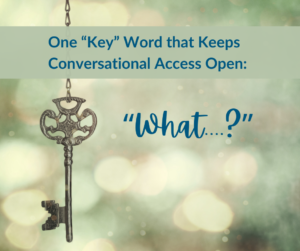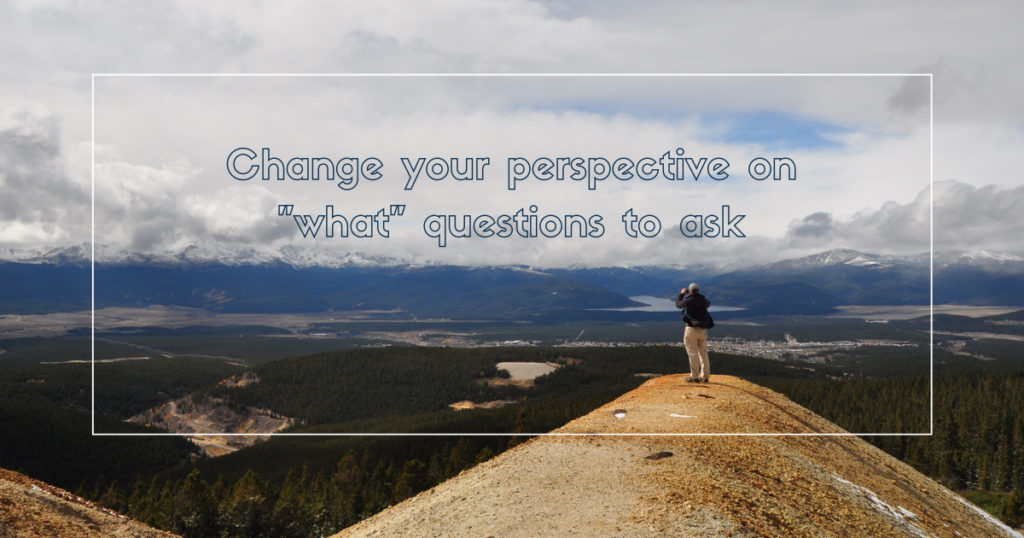Questions: Pointed or pointless?
Are you frustrated with questions that do not get you the response that you hoped for?
Do you wonder how a question can unintentionally end up sparking controversy or hurt feelings (including your own)?
Not all questions are created equal.
“What” questions, kindly asked, can get the job done better and faster. In fact, I would say that one well-crafted ‘What’ question will do twice the work in a tenth of the time. Meanwhile, the “Why” question will be busy sparking a defensive response.
Remember the “5W1H” words that we learned in English class? Every reporter’s tool bag includes those six words (plus some additional variations). The sequence begins with Who and continues with What, When, Where, Why, and How. “Why” was never the leading question. I was taught that the answer to “Why” would flow from the information and context gained from asking the other 5W1H questions (when framed as open-ended questions).
If I could only use one of those 5W1H words to investigate an incident, I would pick “What” hands down.

Recalling the failure of my “Why” questions
In a previous blog post, “My Seven Million Whys – That Got Me Nowhere,” I reviewed the negative impact of “Why” questions on interpersonal communication, specifically in disagreements, strained relationships, and other conflict situations. In those situations, “Why” functions as an accusatory interrogative. It feels like a prosecutor drilling down on a presumed perpetrator of a crime. “Why” forgets that we are supposed to be innocent until proven guilty. The hidden goal of “Why” desires to pin the guilt and penalty on somebody (preferably somebody else).
By its very nature, “Why” is a word that asks for a reason, as in the “why/because” question/answer sequence. “Why” may be the introductory word to a great question about nature.
But in interpersonal relationships, it puts someone (child or adult) on the spot, in a freeze-frame, uncertain of the appropriate response. Our own presumptive hypocrisy allows one of us to ask or demand “Why” from another person as if we could promptly give the “Why” behind each of our own thoughtless or automated actions.
Asking an inappropriate or offensive question requires no training or empathy. Look at our Western culture; we focus on the individual and our rights, including the “right to know.” We want answers – the whole story, the back-story, even the nitty-gritty story. In other cultural settings, especially Eastern cultures, Americans come across as abrupt, rude, and demanding. Isn’t it time for us to make a change?
However, asking worthwhile questions requires learned, practiced, and patient skills.
Opportunities to explore using “What”
Consider the opportunities that well-framed “What” questions could bring to your next conversation during a difficult situation. Unlike the drilling down nature of ‘Why” questions, “What” questions function as survey questions. “What” and “What if” questions invite you to explore, consider, and even create new ideas and options for the issues being discussed. When you are not on the attack and they are not on the defensive, then you can together take a step back to review the scene more objectively.
Am I simplistically suggesting that all this could happen by just replacing one word? No. Instead, I am proposing a mindset shift that begins once “Why” has gotten out of your way. Perspective-taking (yours compared to theirs) is a key step in resolving interpersonal differences. Considering the interests of others is a key step in negotiating conflict resolution. And that requires your best “What” questions. “Why” only detracts and derails the process.
Effective relational “What” questions should be open-ended and geared to gather information. Your up-front goal needs to be a better understanding of the other person’s perspective in each situation. Identify what interests of theirs are at stake. Your exploratory questions create room for negotiation and a giving spirit to maintain engagement in the process and compromise as needed. Address and regard the other person as your fellow man, your brother, who is worthy of your care and consideration. Remember, we are, after all, 99.1% the same. (See this post: Humankind – You and Me Among the Billions).
Clarifying misuse versus labeling
Let me add some clarification before proceeding. First, the problem is not that “Why” is a bad word or that all “Why” questions are improper. Nor does it mean that you should never ask a “Why” question again. Secondly, it does not exonerate all “What” questions as “good” questions. An attacking, demeaning “What” question can do more harm than a “Why” question.
Any word in the languages of the world can be corrupted by common misusage. For instance, God’s name(s) are deployed daily as slang bywords and curse words around the globe. Such misuse defames and defies God, but it never alters His true character.
- Does your present question-asking style promote engaging dialogue?
- Can you think of times when your questions have sparked controversy or hurt feelings?
My best operative questions now begin with “What”
I now find it easier to discover more of God’s purposes (and those of others) by using a proper “what” question. In fact, those same questions help me uncover the purposes hiding in my own heart.
Imagine for a moment, doing a review of your last disagreement or conflict situation in bystander mode. You step back (as if a bystander) to look and listen. Observe the setting. While in that imaginary mode, explore further using several of the following “what” questions to broaden and deepen your perspective. Glimpse other possible perspectives.
How would the answers vary if coming from these three different perspectives: the third-person version, the first-person version, and the bystander version?
- What was I/he/she thinking about before [the situation in question]?
- What was I/he/she hoping/expecting would happen when…[situation]?
- What was I feeling before/after…[situation]?
- What was observable about the setting, timing, conditions of the situation (background data) that I may have missed or ignored before/during/after the interaction?
- What effect could anything (that I may have missed) have had on him/her/the situation?
- What might others have inferred from my demeanor, words, and actions?
- What did I say (or fail to say) to convey that he/she has value as a person?
The goal is to shift your mindset from pre-emptive conclusions to observational information gathering.
Assumptions close your mind to making clear observations that can feed your understanding and correct your misperceptions. If your goal is to resolve a disagreement or conflict situation, you cannot remain entrenched in your own opinion or vested in your own interests and positions. (Read: Wrongly Right: My futile merry-go-round.)
If you take the time to write out answers to the above seven questions from all three perspectives, you may find something that you missed during the real-time conflict situation. That “something” may be the key that opens to the resolution of your disagreement.
When you explore those ‘What’ questions from the other person’s perspective, you obviously do not know what they actually thought or felt. However, start with whatever direct observations could be made without assigning any motives. You could consider a range of possible factors that might have played a part. The purpose here is to open your mind to consider the range of human experiences that can impact a person physically and emotionally, etc., in such situations.
As you get more comfortable answering those questions for yourself in review mode, you will be better prepared to ask appropriate “What” questions to others during your next disagreement.
“What” about our unanswered persistent God questions?
Can we apply these principles to our God questions? You know, the ones where we want to pound on God’s “door” and get an answer – NOW!
As we go through life’s difficulties, our heart cries out to know the what, the why, the where, and the when. Sometimes we just think that he isn’t there or he isn’t listening. We become rash in our impatience, presuming he doesn’t really care. But even then, do we really want to approach God with a clenched fist and rashly spoken “Why” questions that give no relief?
Reconsider the value of asking “What” versus “Why”. “What” questions provide a better context for approaching our relationship (or lack of relationship) with God.
Now, my most useful God question is:
“What do I know about my God?”
“What” questions provide a great structure for gaining and organizing our knowledge of God. I love the insights about God gained from observing the natural creation surrounding us. But without the written record of His Word, the Bible, our knowledge and understanding are incomplete. So that is where I go with my what questions that help me resolve my why issues.
Start Structuring Better God Questions
Two critical perspectives for structuring questions to God, whether situational or general learning:
- First, I come to God with the same grace he has already shown to me. I come recognizing His sacrificial suffering for me, his continual graciousness to me, and his promised final good intentions for me. In that context, I respectfully ask what otherwise might be presumptuous.
- Second, I come with an awareness of His grand plan for all time: His enduring truth arches like a rainbow from eternity before Creation and Eden and then expand through every century of mankind’s story until they anchor on the other end in an eternal Heavenly home.
Based on those two suppositions:
- Frame your questions about the events and issues of your personal life within the known framework of the character of a great and good God who forgives our weaknesses.
- Frame your understanding of His purposes for your personal life within His overarching truths and purposes for all creation and all mankind.
Here’s how your next “what” questions for God might sound:
- God, what is your goal for me in this difficult situation?
- God, what purpose are you working toward in my life through this difficult situation?
- God, what can I learn better through this situation about you, about myself, and about living and loving others?
- God, what should be my response to you and others in this situation?
- God, what can I do to work with you and not against you?
Do you think God cares about the questions we have?
Does it matter to him how we ask those questions?
I would say a definite yes. Look at all the questions recorded in the Bible that people have addressed to God, both rightly and wrongly. You may find other notable Bible characters who asked your question in the past.
David, the Psalmist and ancient king of Israel, asked (and answered) multiple versions of the “does God care” question.
For example, in Psalm 142:4, he laments, “no one cares for my soul.” Then he answers in verses 5 to 7, “I cry to you, O LORD; I say, “You are my refuge, my portion in the land of the living.” Attend to my cry, …. For you will deal bountifully with me.”
In Psalm 73, after questioning and lamenting to God in desperation over his situation, he turns to reconsider God’s ways, truth, and presence. Everything changed when he recognized God’s purpose and focused on the experience and enjoyment of His presence. The tone of the Psalm changes to praise:
“Whom have I in heaven but you? And there is nothing on earth that I desire besides you. My flesh and my heart may fail, but God is the strength of my heart and my portion forever. Psalm 73:25-26 (ESV)”
Do you need help in answering life’s difficult questions?
If you have been waiting – or silent and hesitant –
to talk with someone about your concerns,
I invite you to start a coaching conversation with me today!


